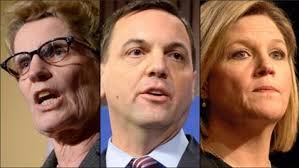Please help rabble.ca stop Harper’s election fraud plan. Become a monthly supporter.
Will Tuesday’s Ontario leaders’ debate determine the outcome of provincial election?
The custodians of our public airwaves — that is to say, the TV networks — have grudgingly agreed to sacrifice 90-minutes of pre-prime time (6:30 p.m. to 8 p.m.) to accommodate this province-wide exercise in democracy.
By dictating that there be only one debate and that the time slot be early and short, the masters of Ontario television are making sure that the democratic exercise does eat into their commercial revenues or into the number of minutes they have available to devote to the endless promotion of their own program offerings.
In an era when most voters don’t attend campaign rallies, there is an argument for public-interest legislation (as exists in the United States) to force the TV industry to provide adequate time for election debates. Three debates of two hours’ duration might be long enough to permit an airing of important issues. But that’s a subject for another day. Today’s subject is Tuesday’s debate and its possible impact on the June 12 election.
Let’s start by acknowledging that this has been a strange campaign. People are barely paying attention. Yet seldom has the Ontario electorate been offered two such vividly different visions — a progressive, interventionist option from Kathleen Wynne’s Liberals versus a classic conservative option (smaller government, reduced levels of public services, fewer regulations and lower corporate taxes) from Tim Hudak’s Tories.
Meanwhile, Andrea Horwath, seeing a yawning gulf between Wynne on the left and Hudak on the right, is determined to drive her New Democrats into that space, even if it means abandoning some longstanding socialist causes, such as public pensions, to the newly left Liberals.
As a rule, television debates do not determine the outcomes of elections — Kennedy-Nixon in 1960 and Mulroney-Turner in 1984 may be exceptions — but Wynne-Hudak-Howarth could change the course of the remaining days of the campaign. For many voters, the debate, short and superficial though it may be, will be a first opportunity to compare the leaders and their platforms.
They may not like what they see and hear. They may not find it credible that Hudak could create one million new jobs in the province or that he could eliminate 100,000 public-sector positions without drastically compromising education and other essential services. They may not be convinced that Wynne has put the Liberal spending scandals behind her or that she can control Ontario’s deficit. And, knowing that Horwath may emerge with the balance of power once again, do they know what she wants and where she is going? Is she a closet liberal or a conservative wannabe?
It is highly unlikely that the debate will cause a stampede in any direction. But if it injects a measure of clarity into the election, pollsters would be relieved. They’ve been flummoxed so far. Their smorgasbord of projections has run the gamut from majority Liberal to majority Progressive Conservative. One day the Liberals are ahead, next day it’s the Tories.
The confusion is abetted by a debate within the polling fraternity, a debate that fascinates political groupies and bewilders everyone else. Traditionally, pollsters work by sampling eligible voters — everyone who is of voting age. By this method, the Liberals and Tories seem to be in a dead heat, with about 36 per cent apiece (short of a majority).
This time, however, some pollsters are narrowing the sample from eligible voters to “likely” voters. It seems that Conservatives — being older, more settled and perhaps more distrustful of anyone who wants to spend their money — are more determined to turn out to vote. If “likely” voters alone are considered, the Tories show a lead of as many as ten points over the Liberals.
This suggests Wynne needs to step up her ground game — to raid the NDP by relentlessly exploiting fear of a Hudak government while dragging every living breathing Liberal to the polls on June 12. Hudak, meanwhile, needs to keep playing (loudly) to his already motivated base.
Cambridge resident Geoffrey Stevens, an author and former Ottawa columnist and managing editor of the Globe and Mail, teaches political science at Wilfrid Laurier University and the University of Guelph. His column appears weekly in Waterloo Region Record and Guelph Mercury. He welcomes comments at geoffstevens[at]sympatico.ca



